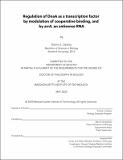Regulation of DnaA as a transcription factor by modulation of cooperative binding, and by arrA, an antisense RNA
Author(s)
Sedivy, Emma L.(Emma Louise)
Download1191838614-MIT.pdf (2.139Mb)
Other Contributors
Massachusetts Institute of Technology. Department of Biology.
Advisor
Alan D. Grossman.
Terms of use
Metadata
Show full item recordAbstract
DnaA is both the bacterial replication initiator and a transcription factor. Both activities are highly conserved and closely regulated. The mechanisms regulating its replication initiation activity have been well studied. Most organisms regulate both the abundance DnaA protein and its activity through a combination of evolutionarily divergent mechanisms. However, the mechanisms governing its role as a transcription factor are poorly understood, especially in Gram-positive organisms like Bacillus subtilis. I described the role of a small antisense RNA in the dnaA region, arrA, which represses dnaA. Mutation of the arrA promoter resulted in increased DnaA levels, which were insufficient to disrupt replication initiation but affected cellular physiology and expression of DnaA targets. In particular, arrA was required for proper sporulation. I also asked whether two of the previously described mechanisms regulating DnaA as the replication initiator in B. subtilis affect its activity as a transcriptional repressor. I found that forms of DnaA that are inhibited for replication initiation are still active transcriptional repressors. This interesting finding raises the possibility that some DnaA targets are regulated in a cell-cycle dependent manner, whereas others are repressed regardless of replication status.
Description
Thesis: Ph. D., Massachusetts Institute of Technology, Department of Biology, May, 2020 Cataloged from the official PDF of thesis. Includes bibliographical references (pages 82-96).
Date issued
2020Department
Massachusetts Institute of Technology. Department of BiologyPublisher
Massachusetts Institute of Technology
Keywords
Biology.